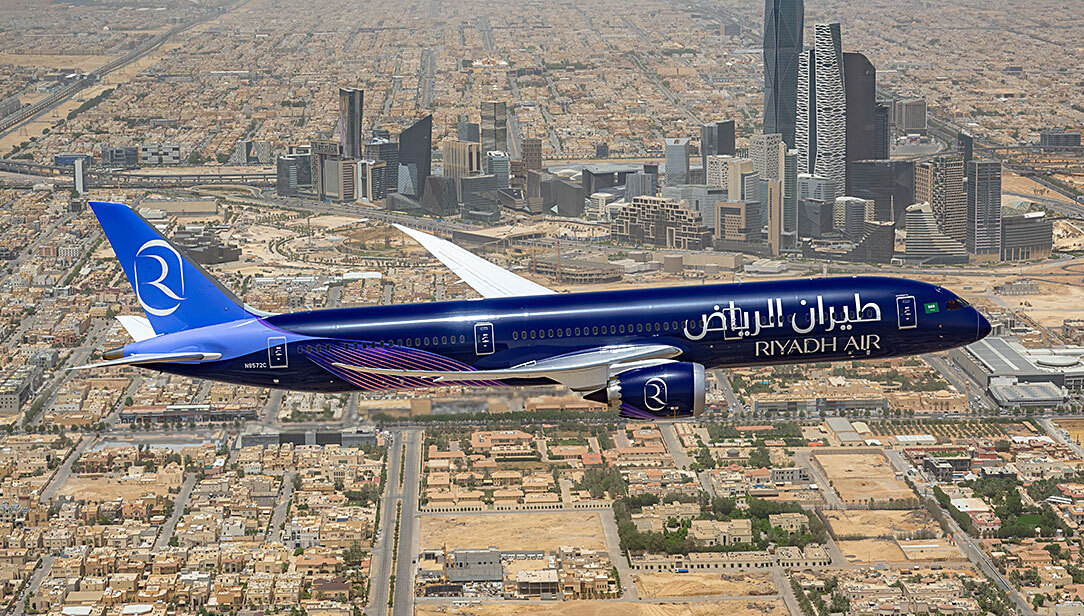
Delta Air Lines has announced a major partnership with a new Saudi Arabian luxury airline that isn’t due to start carrying paying passengers until 2025 at the very earliest.
On Tuesday, at Delta’s Worth Headquarters in Atlanta, Georgia, the carrier officially signed a Strategic Cooperation Memorandum of Understanding with Riyadh Air, which includes plans for Delta to launch non-stop flights to the Saudi capital.
The announcement caught the industry off guard, given Delta CEO Ed Bastian’s often fierce criticism of Persian Gulf airlines and Delta’s bankrolling of a Washington DC lobby group that took aim at the likes of Emirates and Qatar Airways.
Riyadh Air is a no-expenses spared full-service carrier that is funded by Saudi Arabia’s government-owned public investment fund. The airline aims to help transform the Kingdom’s economy as reformer Crown Prince Mohammed bin Salman Al Saud sets his sights on turning Saudi Arabia into a luxury tourism destination.
On Tuesday, there was no evidence of Delta previously holding a grudge against Persian Gulf carriers, with Bastian praising Riyadh Air’s “commitment to providing an elevated customer experience” and thanking the airline for the opportunity and its government backers.
The agreement includes interline and codeshare deals, along with what Delta described as a “deeper partnership” which encompasses “loyalty, customer experience, digital transformation and broader aviation services such as maintenance, repair and overhaul services, ground handling and training”.
Delta also hopes to seek an immunized joint venture with Riyadh Air, and as part of the agreement, Delta has promised to open a new non-stop route to Riyadh.
Up until early 2020, Delta had joined forces with American Airlines and United to battle the so-called Middle East Three airlines – Emirates, Etihad and Qatar Airways which they accused of skewing competition with government-funded subsidies.
That battle was quietly ditched in February 2020 when American Airlines announced a major partnership with fellow Oneworld alliance carrier Qatar Airways.
Two years later, United Airlines cosied up with Dubai-based Emirates with a major codeshare agreement, as well as its own non-stop flights to the United Arab Emirates.
American and United have both benefited massively from their respective deals with the Persian Gulf carriers, bringing in new passengers to feed into their domestic networks.
Delta had seemingly been reluctant to strike its own deal, although if a codeshare agreement was to be struck, Abu Dhabi’s Etihad Airways had seemed like a logical choice.
What’s perhaps odd about this agreement with Riyadh Air, is that the airline’s CEO Tony Douglas, has said on a number of occasions that the carrier has no intentions of taking on the likes of Emirates and Qatar Airways by going after transit passengers but rather wants to focus on point-to-point flights to Saudi Arabia.
Perhaps Riyadh Air will end up carrying more transit passengers than previously envisioned, and if that is the case, today’s agreement will see US-bound passengers booked onto connecting flights with Delta.
Late last year, Riyadh Air signed its first codeshare agreement outside of Saudi Arabia with Turkish Airlines. The deal could see Turkish Airlines provide maintenance and engineering services while Riyadh Air establishes its own in-house facilities.
Mateusz Maszczynski honed his skills as an international flight attendant at the most prominent airline in the Middle East and has been flying ever since... most recently for a well known European airline. Matt is passionate about the aviation industry and has become an expert in passenger experience and human-centric stories. Always keeping an ear close to the ground, Matt's industry insights, analysis and news coverage is frequently relied upon by some of the biggest names in journalism.








Unless and until MBS allows the consumption of alcohol by non-Muslims and implements other social tolerance reforms in the KSA, who is going between KSA and Detroit (the most likely base for a flight to Riyadh) without alcohol?
Right now, you would get denied entry to KSA if you wore a crucifix. Having a Bible — Christian, but especially Jewish — could result in you getting arrested. If you thought the firestorm over Americans being arrested and jailed in the Turks and Caicos for some random ammunition in their bags was bad, wait until a Christian is locked up in Riyadh and sentenced to death for proselytizing.